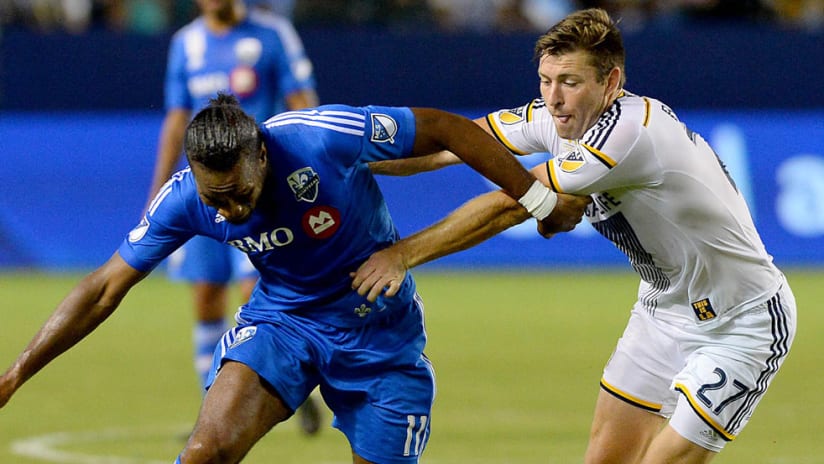CARSON, Calif. – Dave Romney has so much to be thankful for this Thanksgiving as his most improbable year – one that saw him rise from, well, nowhere into one of MLS's young players most worth watching – nears its finish.
The 22-year-old defender, not really on anyone's radar when 2015 began, turned a tryout into a regular gig with the LA Galaxy's reserve side, impressed enough for the first team to call him up on loan, then won an MLS contract and distinguished himself in limited minutes as perhaps the future for the club at center back.
Romney's soccer career, dating to his preteen days with Southern California youth powerhouse Irvine Strikers, has been fated to fizzle out again and again only for some piece of fortune – almost always a recommendation from one friend to another – to provide an unexpected path forward.
He was the only player among a “core five” of Strikers who had played together nearly a decade that wasn't offered a scholarship to Cal and figured his soccer days were done when nobody else showed any interest. A phone call, a scouting trip, and he was off to the University of San Francisco – without scholarship money, at first – where he started nearly every match for four years.
Nobody in MLS took much notice when he finished his college career a year ago – he was invited to the San Jose Earthquakes' combine of local talent, then heard nothing further – and so his soccer career, he thought, was done, and it was time to put his finance degree to work. Another phone call, a preseason trial, and he was soon starting on the LA Galaxy II's backline.
And now Romney, a distant relative of 2012 Republican Party presidential candidate Mitt Romney, has Olympic aspirations after making his first appearance for any United States national team during the U-23s' friendlies earlier this month in Brazil. That happened because the Galaxy sent footage of Romney to Andreas Herzog.
One opportunity leads to another and then to another. Romney has a knack for making every opportunity count.
“I think David is a great example that there is not one road map for a soccer player to make it to the next level,” said Erik Visser, who brought Romney to USF after Irvine Strikers director of coaching Don Ebert told him he needed to take a look. “You can't always look into a crystal ball and predict where someone is going to land.”
'In my head, I'm freaking out'
Romney landed with the Galaxy's first team in July. He'd been called up, along with Galaxy II teammates Ariel Lassiter, Daniel Steres and Jack McBean, for LA's International Champions Cup friendlies against Club America and Barcelona and hadn't looked bad in second-half stints at left back.
He hadn’t even expected to see the field. The foursome had trained with the first team ahead of the first ICC match, but Galaxy II players are sometimes used to broaden numbers in practice sessions. No big deal.
“[Assistant coach] Pat Noonan was talking to me [on the field],” Romney said, “and he was saying, 'So in the game, we're going to need you to do this, we're going to need you to get forward,' and stuff like that. And I was really confused, because this guy is talking to me like I'm playing this weekend. What's going on?
“So I went up to B.J., Bradford Jamieson, and I'm saying, 'Hey, Pat's talking to me like I'm going to play this weekend,' and he's like, 'Yeah, you are.' And at that moment, I was like, 'Oh, jeez. Oh, god.'”
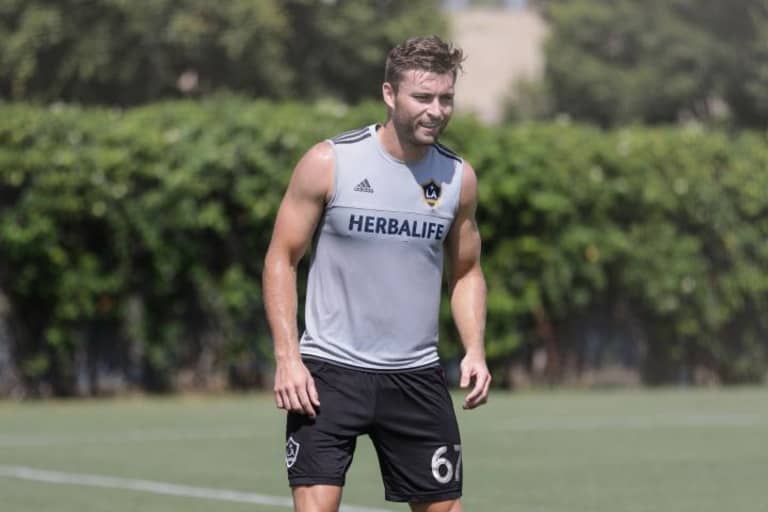
The call-up for a July 25 game at Houston was more of a shock. Starting left back Robbie Rogers was suspended, Todd Dunivant and Oscar Sorto were hurt, and A.J. DeLaGarza was needed in the middle, with Omar Gonzalez away on international duty.
Galaxy coach Bruce Arena pulled Romney into the StubHub Center weight room and let him know he would start at left back against the Dynamo. No USL player had been loaned up for an MLS match before.
“Obviously, I played it cool. Like, 'Of course, yeah, I'm ready,' and everything,” Romney said. “But in my head, I'm freaking out.”
The Dynamo dominated LA, but Romney won Arena's praise as the only Galaxy player to win his battle in a 3-0 defeat. A week and a half later, on the eve of LA's CONCACAF Champions League opener, he signed a first-team deal.
He made another eight appearances for the first team, including a superb 90 minutes against Didier Drogba in a scoreless draw with Montreal in September and starts in all four CCL group-stage matches, winning praise from all corners.
He wasn't perfect – he beat himself up after letting Brad Evans get free to nod a corner kick for Chad Barrett to finish as Seattle rallied for a stoppage-time draw with LA in early October – but he was steadier than your average rookie. It's what got him to the first team.
'Didn't put a foot wrong'
Eddie Soto, a former U.S. youth international who was twice drafted but never played in MLS, had been a Galaxy Academy coach during his tenure as an assistant at UCLA. He took charge of USF's program last year, spent a season fine-tuning Romney's game, then – as Romney was about to accept a job offer from Credit Suisse – told Galaxy II head coach Curt Onalfo and David Kammarman, the club's director of soccer operations, that they wouldn't be sorry if they gave the young defender a chance.
Romney is the kind of players coaches love. He's remarkably consistent, has an engine that doesn't quit, thinks the game at an advanced level, and will do anything that's asked of him. There's little flash to him game, and he sometimes escapes notice – even among those with a fine eye for talent.
Soto quickly found that Romney had “the qualities of a pro.”
“The way he took every day was professional,” Soto said. “He was extremely consistent every game, every practice. You knew what you were going to get from the kid. ... He's just a great team player. He's going to listen to everything you say, he's going to do it, and he's going to do it to the best of his ability.”
USF assistant coach Alex Yi, who played three years with Dallas, told Romney that he wasn't “going to impress anybody in a short combine, but when they see the kind of production you give on a day-to-day basis and how consistent you are, if you get yourself into a system, you're going to thrive.”
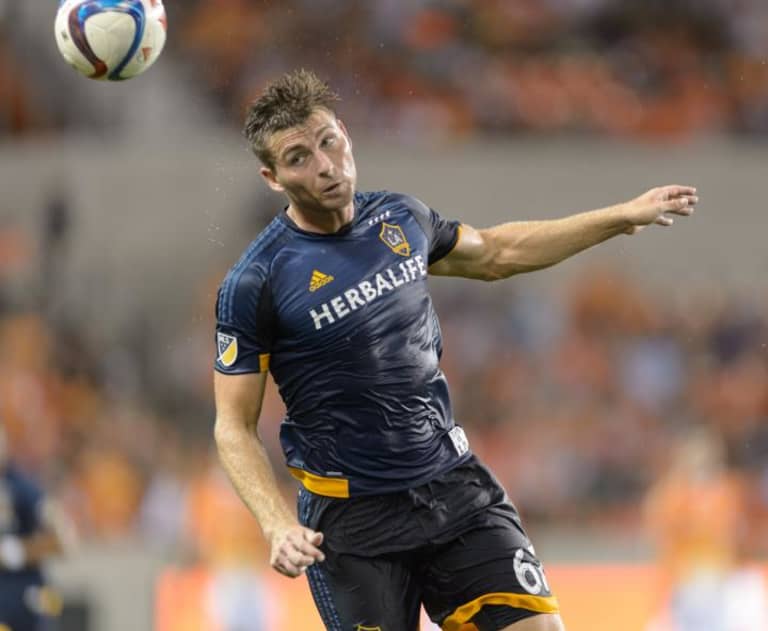
Onalfo gave him a chance, and thrive he did.
Romney had played mostly left back at USF, his primary position since his mid-teens, and he had the foot skills and pace required on the flank, but his body – 6-foot-2 with some width – screamed center back. He'd won a starting spot in the middle by the Galaxy II's third USL match and made 17 appearances with the side before the first team beckoned.
“The amazing thing about Dave is when he had his opportunity, he didn't put a foot wrong,” said Onalfo, who was a defender. “Usually young guys like him, they make a lot of mistakes, and when you're a central defender, those mistakes result in goals. You can see them.
“The thing with him, there were very few of those.”
Romney, who grew up going to LA games and still lives at home, says his time with Galaxy II made the transition to the Galaxy much simpler. Rather than “just being thrown in with the Galaxy and told, 'Here, try to play with these guys,'” he used USL as something of a stepladder.
“I took my college game to a USL game, slowly improved to that [level], and I think a USL version of Dave Romney fit in much better with an MLS version,” Romney said. “Jumping from the 'college' Dave to the 'Galaxy I' Dave would have been much tougher than me getting four months with the IIs and getting my confidence up and knowing that the coaching staff had already seen me and liked me.”
Onalfo calls Romney's “great story” an inspiration for “other players who have that dream” of playing professional soccer.
'Blessing in disguise'
Romney, like every other young player with the Irvine Strikers, dreamed of playing the pro game, but there was nothing that suggested it might be possible. He was a late-bloomer, and when his friends hit puberty, he lagged behind.
He was 5-foot-4 his freshman year at University High School in Irvine, about 30 miles southeast of StubHub Center in south Orange County. He'd gone from starter with the Strikers to a bench role with limited playing time.
“It sucked at the time, but it was definitely a blessing in disguise,” said Romney, who played every position, including goalkeeper, at some point during his youth career. “I was a small player, I just couldn't keep up physically, but that kind of forced me to pick it up mentally. I had to think quicker. I had to have a better touch if I wanted to survive.”
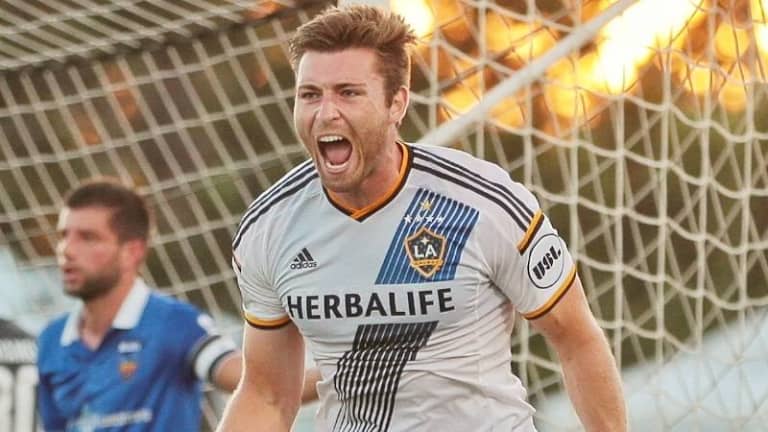
As he went through a growth spurt in high school, Romney was able to add a physical dimension to his game, not that anyone seemed to notice. Nobody was interested in him until Ebert, one of Southern California's finest youth coaches, called Visser, then the USF coach. Several Irvine Strikers had found their way to the Dons, so Visser and his staff took a look and liked what they saw.
“Athletically he was good,” Visser said. “I thought he was technically very clean. Left-footer. His foundation was very good. Very good entry pass, and he could also hit a clean long ball. Not one of those lofting balls, but he could drive the ball, and from the left side, that's really a commodity.”
Romney, who felt like the “odd man out” as his pals prepared to depart for Berkeley, says he was “just ecstatic. It's like: 'Somebody wants me!'” He started all but seven games over four seasons with the Dons.
'Profile of a world-class center back'
Nobody expected Romney to rise so quickly with the Galaxy – he's the first Los Dos player to move up to the first team, although the club expects others to follow – but it's the quickness, not the rise, that's so stunning.
“You put him at the next level, he's one of those kids that figures it out,” Visser said. “He's smart enough to figure out at the next level what are the things you need to do to be successful.”
The Galaxy, through Kammarman, made sure that Herzog, who's trying to get the US into next summer's Rio de Janeiro Olympics, knew what Romney brings to a team. When New York Red Bulls center back Matt Miazga was called up to the full national team for the start of World Cup qualifying, a slot opened up with the U-23s, and Romney got the call.
He accompanied the team to Brazil for two friendlies, watched the first from the bench, impressed in training, then played 90 minutes at left back Nov. 15 in a 5-1 loss in Belen.
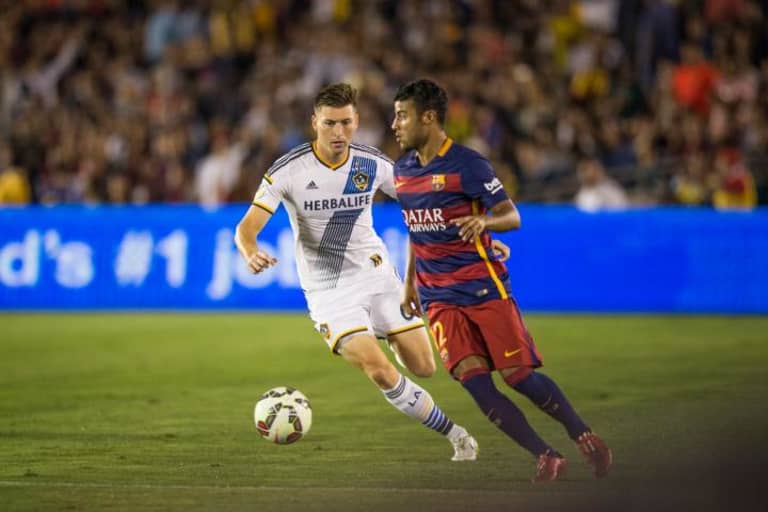
“I played really well in training, and I guess that got them the confidence to start me in the [second] game,” said Romney, who with his father attended the 2000 Sydney Olympics, where he saw the Spain-Cameroon men's soccer final, and 2002 Salt Lake City Winter Olympics. “Before the game [Herzog] said, 'No need to be nervous, you're a great player, yesterday [in training] was perfect, so just do yesterday.' I knew I had the confidence of the coaching staff, so I just went out there and once it hit the 20-minute mark, it was like any other game.
“Hopefully, I impressed them enough when I was there to get invited back for the January camp, if we have one, and then I just want to be there to contribute in March if they need me for the Colombia [home-and-home playoff series for an Olympic berth].”
He's got plenty of room for growth. Onalfo says he has “the profile of a world-class center back” and “a really bright future” but “probably is going to still need to get some games with [Galaxy II] in his development.”
Romney knows there's a lot of work ahead, starting with the offseason.
“I want to get better physically,” he said. “I want to lean down a little bit. I want my body fat to get lower. I want to get quicker, faster, just better endurance. Mentally, just get more confident, I guess. Watch more film – I have all our games on my DVR back home, so I just watch those, see what I could have done better in each situation. And technically, just hone different things here and there.
“There's a lot of things that I already know that I want to get better at and that I'm going to need to get better at if I'm going to be a consistent starter in this league.”

